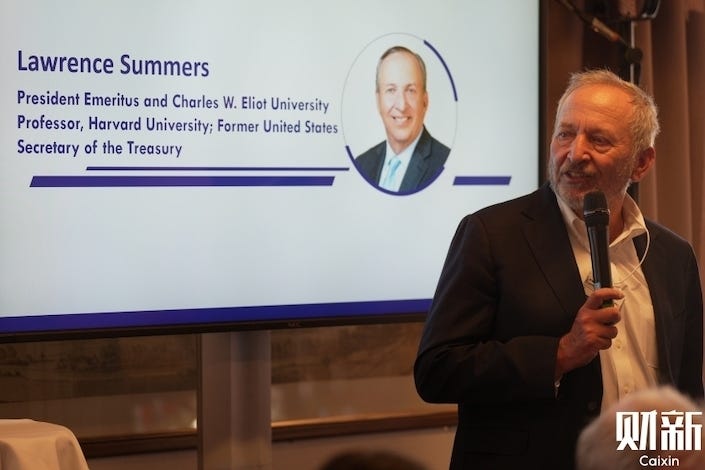Caixin at Davos: AI is Breakthrough on a Par With the Discovery of Fire, Lawrence Summers Tells Davos CEO Lunch
Former U.S. Treasury Secretary calls for greater U.S.-China collaboration at a critical time
Former U.S. Treasury Secretary Lawrence Summers speaks at the 2025 Davos-Caixin CEO Luncheon on Jan. 21, 2025.
Lawrence Summers, the former U.S. Treasury Secretary, discussed the transformative rise of artificial intelligence (AI) and shifting global political and economic dynamics at this year’s Davos-Caixin CEO Luncheon, calling them the defining forces of the decade.
He emphasized AI’s unprecedented potential for self-enhancement and its far-reaching impact across industries and societies.
The annual event, hosted by Caixin on Tuesday on the sidelines of the 2025 World Economic Forum in Davos, Switzerland, focused on how breakthroughs in AI, alongside global political polarization and the resurgence of populism, are reshaping the world. It also addressed whether nations can bridge divides to tackle global challenges in trade, climate and health through collaboration and innovation.
Quoting Vladimir Lenin, Summers said, “There are decades where nothing happens, and weeks where decades happen … I believe we may be living through another immensely consequential decade, shaped by two interrelated factors we are only beginning to grasp.”
Summers likened AI’s impact on the internet to the computer’s leap over the calculator, calling it a breakthrough on par with the discovery of fire, the invention of the wheel and the harnessing of electricity. He emphasized AI’s unique capacity for recursive improvement — the power to self-enhance — making it a truly revolutionary technology.
“While predicting the precise timeline for AI’s evolution is difficult, it’s clear that its transformative impact is already ahead of expectations,” Summers said, pointing out that progress has already outpaced expectations, with tasks predicted to take years now completed in months.
He noted that AI’s disruptive potential could surpass even the economic shock brought by China’s integration into global supply chains, affecting nearly every aspect of life, from labor markets to national economies. This scale of transformation, he argued, rivals the most significant shifts in modern history.
Summers also addressed the growing challenges faced by democratic institutions, citing rising global discontent with elites and the urgent need for political systems to adapt to unprecedented changes. Drawing historical parallels, he described how major societal changes, like the shift from agricultural to industrial economies, created both opportunities and turmoil, including wars and economic depressions.
He noted that these dynamics are not only domestic issues but critical on the international stage, particularly for the United States and China.
He likened the two nations to “two people in a lifeboat in rough seas — they may not be comfortable with each other, but they must find a way to row together to survive.”
Stressing their mutual need for coexistence despite tensions, he suggested that stopping cyberattacks on U.S. infrastructure and addressing privacy concerns would help rebuild trust. On the prospect of tech decoupling, he predicted that U.S. export controls on China would persist, with TikTok remaining a sensitive issue.
Summers acknowledged the complexity of the TikTok ban, saying its resolution depended on various statutory considerations.
Closing on a hopeful note, Summers said, “Sometimes, it has to be dark to see the stars.” He argued that shared challenges, such as those posed by AI, offer opportunities for cooperation. Thoughtful dialogue on macroeconomic issues — such as addressing trade imbalances and supporting China’s shift to domestic demand-driven growth — could pave the way for collaboration, mutual understanding and shared progress.
Other speakers at the luncheon include Max Tegmark, MIT professor and founder of the Future of Life Institute, Hong Kong Financial Secretary Paul Chan, Kweichow Moutai Group General Manager Wang Li, Primavera Capital Group Chairman Fred Hu, and Asian Infrastructure Investment Bank Chief Economist Erik Berglöf.
They talked about AI’s rapid growth, business opportunities in AI-driven efficiency and innovation, the impact from geopolitical shifts, particularly U.S.-China relations, on global tech as well as ethical and policy challenges in AI.




